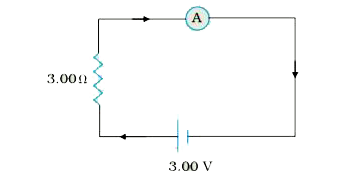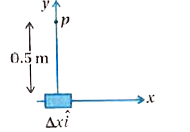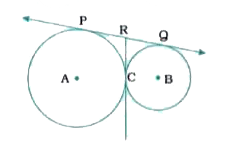SECTION B (NUMERICAL FROM TEXTUAL ILLUSTRATIONS) from KUMAR PRAKASHAN KENDRA PHYSICS (GUJRATI ENGLISH) MOVING CHARGES AND MAGNETISM for Class 12
| Class 12 | PHYSICS |
| Chapter | MOVING CHARGES AND MAGNETISM |
| KUMAR PRAKASHAN KENDRA PHYSICS (GUJRATI ENGLISH) | SECTION B (NUMERICAL FROM TEXTUAL ILLUSTRATIONS) |
| Medium | English |
| Academic Year | 2023-2024 |
Question 7
A cyclotron's oscillator frequency is 10 MHz. What should be the operating magnetic field for accelerating protons ? If the radius of its 'dees' is 60 cm, what is the kinetic energy (in MeV) of the proton beam produced by the accelerator.
(e=1.60×10−19C,mp=1.67×10−27kg,1MeV=1.6×10−13J)View SolutionQuestion 10
A straight wire carrying a current of 12 A is bent into a semicircular arc of radius 2.0 cm as shown in figure (a). Consider the magnetic field →B at the centre of the arc.
(a) What is the magnetic field due to the straight segments ?
(b) In what way the contribution to →B from the semicircle differs from that of a circular loop and in what way does it resemble ?
( c) Would your answer be different if the wire were bent into a semicircular arc of the same radius but in the opposite way as shown in figure (b) ?
 View Solution
View SolutionQuestion 17
The horizontal component of the earth's magnetic field at a certain place is 4.0×10−5T and the direction of the field is from the geographic south to the geographic north. A very long straight conductor is carrying a steady current of 1A. What is the force per unit length on it when it is placed on a horizontal table and the direction of the current is east to westView SolutionQuestion 18
The horizontal component of the earth's magnetic field at a certain place is 2.5×10−5T and the direction of the field is from the geographic south to the geographic north. A very long straight conductor is carrying a steady current of 0.5 A. What is the force per unit length on it when it is placed on a horizontal table and the direction of the current is (a) east to west, (b) south to north?View SolutionQuestion 19
A 100 turn closely wound circular coil of radius 10 cm carries a current of 3.2 A. (a) What is the field at the centre of the coil? (b) What is the magnetic moment of this coil? The coil is placed in a vertical plane and is free to rotate about a horizontal axis which coincides with its diameter. A uniform magnetic field of 2T in the horizontal direction exists such that initially the axis of the coil is in the direction of the field. The coil rotates through an angle of 90∘ under the influence of the magnetic field. (c) What are the magnitudes of the torques on the coil in the initial and final position? (d) What is the angular speed acquired by the coil when it has rotated by 90∘? The moment of inertia of the coil is0.1kgm2.View SolutionQuestion 20
(a) A current-carrying circular loop lies on a smooth horizontal plane. Can a uniform magnetic field be set up in such a manner that the loop turns around itself (i.e., turns about the vertical axis). (b) A current-carrying circular loop is located in a uniform external magnetic field. If the loop is free to turn, what is its orientation of stable equilibrium? Show that in this orientation, the flux of the total field (external field + field produced by the loop) is maximum. (c) A loop of irregular shape carrying current is located in an external magnetic field. If the wire is flexible, why does it change to a circular shape? View SolutionQuestion 21
In the circuit the current is to be measured. What is the value of the current if the ammeter shown (a) is a galvanometer with a resistance RG=60.00Ω, (b) is a galvanometer described in (a) but converted to an ammeter by a shunt resistance rs=0.02Ω, (c ) is an ideal ammeter with zero resistance?
 View Solution
View SolutionQuestion 22
In the circuit the current is to be measured. What is the value of the current if the ammeter shown (a) is a galvanometer with a resistance RG=60.00Ω, (b) is a galvanometer described in (a) but converted to an ammeter by a shunt resistance rs=0.02Ω, (c ) is an ideal ammeter with zero resistance?
 View Solution
View SolutionQuestion 31
A square coil of side 10 cm consists of 20 turns and carries a current of 12 A. The coil is suspended vertically and the normal to the plane of the coil makes an angle of 30∘ with the direction of a uniform horizontal magnetic field of magnitude 0.80 T. What is the magnitude of torque experienced by the coil? View SolutionQuestion 32
Two moving coil meters M1 and M2 have the following particulars :
R1=10Ω,N1=30
A1=3.6×10−3m2,B1=0.25T
R2=14Ω,N2=42
A2=1.8×10−3m2,B2=0.50T
(The spring constants are identical for the two meters). Determine the ratio of (a) current sensitivity and (b) voltage sensitivity of M2 and M1 . View SolutionQuestion 33
In a chamber, a uniform magnetic field of 6.5 G(1G=10−4T) is maintained. An electron is shot into the field with a speed of 4.8x×106ms−1 normal to the field. Explain why the path of the electron is a circle. Determine the radius of the circular orbit. (e=1.5x×10−19C,me=9.1x×10−31kg) View SolutionQuestion 35
(a) A circular coil of 30 turns and radius 8.0 cm carrying a current of 6.0 A is suspended vertically in a uniform horizontal magnetic field of magnitude 1.0 T. The field lines make an angle of 60∘ with the normal of the coil. Calculate the magnitude of the counter torque that must be applied to prevent the coil from turning. (b) Would your answer change, if the circular coil in (a) were replaced by a planar coil of some irregular shape that encloses the same area? (All other particulars are also unaltered.) View SolutionQuestion 36
Two concentric circular coils X and Y of radii 16 cm and 10 cm, respectively, lie in the same vertical plane containing the north to south direction. Coil X has 20 turns and carries a current of 16 A, coil Y has 25 turns and carries a current of 18 A. The sense of the current in X is anticlockwise, and clockwise in Y, for an observer looking at the coils facing west. Give the magnitude and direction of the net magnetic field due to the coils at their centre.View SolutionQuestion 37
A magnetic field of 100 G (1G=10−4T)is required which is uniform in a region of linear dimension about 10 cm and area of cross-section about 10−3m2 . The maximum current-carrying capacity of a given coil of wire is 15 A and the number of turns per unit length that can be wound round a core is at most 1000 turns m−1. Suggest some appropriate design particulars of a solenoid for the required purpose. Assume the core is not ferromagnetic. View SolutionQuestion 39
A toroid has a core (non-ferromagnetic) of inner radius 25 cm and outer radius 26 cm, around which 3500 turns of a wire are wound. If the current in the wire is 11 A, what is the magnetic field
(a) outside the toroid,
(b) inside the core of the toroid, and
( c) in the empty space surrounded by the toroid.View SolutionQuestion 40
A magnetic field that varies in magnitude from point to point but has a constant direction (east to west) is set up in a chamber. A charged particle enters the chamber and travels undeflected along a straight path with constant speed. What can you say about the initial velocity of the particle? View SolutionQuestion 41
An electron emitted by a heated cathode and accelerated through a potential difference of 2.0 kV, enters a region with uniform magnetic field of 0.15 T. Determine the trajectory of the electron if the field (a) is transverse to its initial velocity, (b) makes an angle of 30º with the initial velocity. View SolutionQuestion 42
A magnetic field set up using Helmholtz coils (described in Exercise 4.16) is uniform in a small region and has a magnitude of 0.75 T. In the same region, a uniform electrostatic field is maintained in a direction normal to the common axis of the coils. A narrow beam of (single species) charged particles all accelerated through 15 kV enters this region in a direction perpendicular to both the axis of the coils and the electrostatic field. If the beam remains undeflected when the electrostatic field is 9.0×10−5Vm−1, make a simple guess as to what the beam contains. Why is the answer not unique ?View SolutionQuestion 43
A straight horizontal conducting rod of length 0.45 m and mass 60 g is suspended by two vertical wires at its ends. A current of 5.0 A is set up in the rod through the wires. (a) What magnetic field should be set up normal to the conductor in order that the tension in the wires is zero? (b) What will be the total tension in the wires if the direction of current is reversed keeping the magnetic field same as before? (Ignore the mass of the wires.) g=9.8ms−2 . View SolutionQuestion 45
A uniform magnetic field of 1.5 T exists in a cylindrical region of radius10.0 cm, its direction parallel to the axis along east to west. A wire carrying current of 7.0 A in the north to south direction passes through this region. What is the magnitude and direction of the force on the wire if, (a) the wire intersects the axis, (b) the wire is turned from N-S to northeast-northwest direction, (c) the wire in the N-S direction is lowered from the axis by a distance of 6.0 cm?View SolutionQuestion 47
A circular coil of 20 turns and radius 10 cm is placed in a uniform magnetic field of 0.10 T normal to the plane of the coil. If the current in the coil is 5.0 A, what is the (a) total torque on the coil, (b) total force on the coil, (c) average force on each electron in the coil due to the magnetic field? (The coil is made of copper wire of cross-sectional area 10−5m2, and the free electron density in copper is given to be about 1029m−3 .) View SolutionQuestion 48
A solenoid 60 cm long and of radius 4.0 cm has 3 layers of windings of 300 turns each. A 2.0 cm long wire of mass 2.5 g lies inside the solenoid (near its centre) normal to its axis, both the wire and the axis of the solenoid are in the horizontal plane. The wire is connected through two leads parallel to the axis of the solenoid to an external battery which supplies a current of 6.0 A in the wire. What value of current (with appropriate sense of circulation) in the windings of the solenoid can support the weight of the wire?View SolutionQuestion 55
There are 21 marks (zero to 20) on the dial of a galvanometer, that is there are 20 divisions. On passing 10μA current through it, it shows a deflection of 1 division. Its resistance is 20Ω.
(a) How can it be converted into an ammeter which can measure 1 A current ?
(b) How can we change it into a voltmeter to measure a pd of 1 V ? Also find the effective resistance of both of the above mentioned meters.View SolutionQuestion 56
Distance between two very long parallel wires is 0.2 m. Electric currents of 4 A in one wire and 6 A in the other wire are passing in the same direction. Find the position of a point on the perpendicular line joining the two wires at which the magnetic field intensity is zero.
 View Solution
View SolutionQuestion 57
A very long wire is held vertical in a direction perpendicular to the horizontal component of Earth's magnetic field. Find the value of current to be passed through this wire so that this resultant magnetic field at a point 10 cm away from this wire becomes zero. What will be the magnetic induction at a point 10 cm away from the wire on the opposite side of this point ?
Horizontal component of Earth's magnetic field H=0.36×10−4T,μ0=4π×10−7Tm/A.
 View Solution
View SolutionQuestion 61
Two rings X and Y are placed in such a way that their axes are along the X and the Y axes respectively and their centres are at the origin. Both the rings X and Y have the same radii of 3.14 cm. If the current through X and Y rings are 0.6 A and 0.8 A respectively, find the value of the resultant magnetic field at the origin.
(μ0=4π×10−7SI)View SolutionQuestion 62
A very long straight wire carries a current of 5 A. An electron moves with a velocity of 106ms−1 remaining parallel to the wire at a distance of 10 cm from wire in a direction opposite to that of electric current. Find the force on this electron. (Here the mass of electron is taken as constant)
(e=−1.6×10−19C,μ0=4π×10−7SI)View Solution
All Exercises from KUMAR PRAKASHAN KENDRA PHYSICS (GUJRATI ENGLISH) Class 12 PHYSICS MOVING CHARGES AND MAGNETISM
- SECTION A (QUESTION-ANSWERS)
- SECTION A (TRY YOURSELF)
- SECTION B (NUMERICAL FROM .DARPAN. BASED ON TEXTBOOK)
- SECTION B (NUMERICAL FROM TEXTUAL EXERCISE)
- SECTION B (NUMERICAL FROM TEXTUAL ILLUSTRATIONS)
- SECTION C (LONG ANSWER TYPE QUESTIONS)
- SECTION C (MULTIPLE CHOICE QUESTIONS)
- SECTION C (SHORT ANSWER TYPE QUESTIONS)
- SECTION C (VERY SHORT ANSWER TYPE QUESTIONS)
- SECTION D (MCQS ASKED IN COMPETITIVE EXAMS)
- SECTION D (MULTIPLE CHOICE QUESTIONS)






